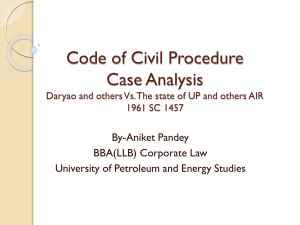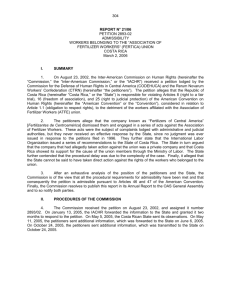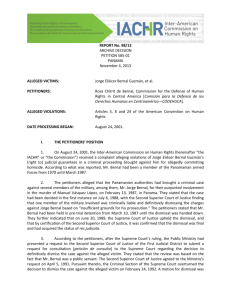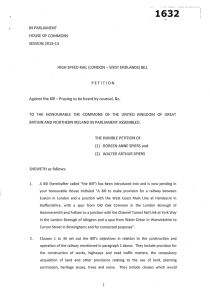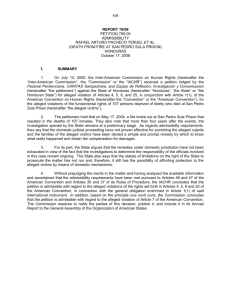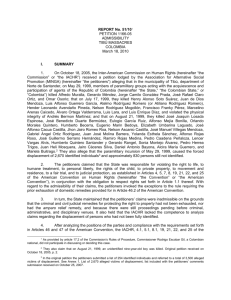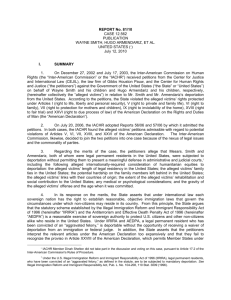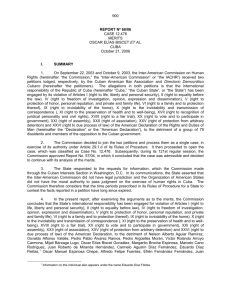Report No. 29/11 - Organization of American States
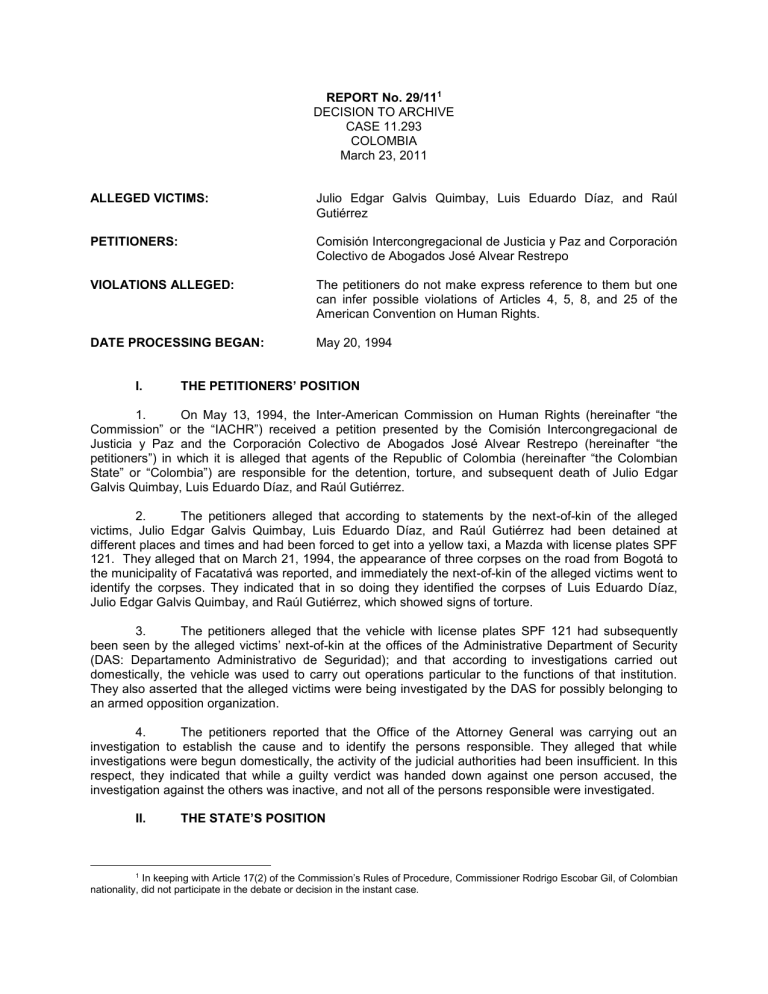
ALLEGED VICTIMS:
REPORT No. 29/11 1
DECISION TO ARCHIVE
CASE 11.293
COLOMBIA
March 23, 2011
Julio Edgar Galvis Quimbay, Luis Eduardo Díaz, and Raúl
Gutiérrez
PETITIONERS: Comisión Intercongregacional de Justicia y Paz and Corporación
Colectivo de Aboga dos José Alvear Restrepo
VIOLATIONS ALLEGED: The petitioners do not make express reference to them but one can infer possible violations of Articles 4, 5, 8, and 25 of the
American Convention on Human Rights.
DATE PROCESSING BEGAN: May 20, 1994
I. THE PETITIONERS’ POSITION
1. On May 13, 1994, the InterAmerican Commission on Human Rights (hereinafter “the
Commission” or the “IACHR”) received a petition presented by the Comisión Intercongregacional de
Justicia y Paz and the Corporación Colectivo de Abogados José Alvear Restrepo (hereinafter “the petitioners ”) in which it is alleged that agents of the Republic of Colombia (hereinafter “the Colombian
State” or “Colombia”) are responsible for the detention, torture, and subsequent death of Julio Edgar
Galvis Quimbay, Luis Eduardo Díaz, and Raúl Gutiérrez.
2. The petitioners alleged that according to statements by the next-of-kin of the alleged victims, Julio Edgar Galvis Quimbay, Luis Eduardo Díaz, and Raúl Gutiérrez had been detained at different places and times and had been forced to get into a yellow taxi, a Mazda with license plates SPF
121. They alleged that on March 21, 1994, the appearance of three corpses on the road from Bogotá to the municipality of Facatativá was reported, and immediately the next-of-kin of the alleged victims went to identify the corpses. They indicated that in so doing they identified the corpses of Luis Eduardo Díaz,
Julio Edgar Galvis Quimbay, and Raúl Gutiérrez, which showed signs of torture.
3. The petitioners alleged that the vehicle with license plates SPF 121 had subsequently been seen by the alleged victims’ next-of-kin at the offices of the Administrative Department of Security
(DAS: Departamento Administrativo de Seguridad); and that according to investigations carried out domestically, the vehicle was used to carry out operations particular to the functions of that institution.
They also asserted that the alleged victims were being investigated by the DAS for possibly belonging to an armed opposition organization.
4. The petitioners reported that the Office of the Attorney General was carrying out an investigation to establish the cause and to identify the persons responsible. They alleged that while investigations were begun domestically, the activity of the judicial authorities had been insufficient. In this respect, they indicated that while a guilty verdict was handed down against one person accused, the investigation against the others was inactive, and not all of the persons responsible were investigated.
II. THE STATE’S POSITION
1 In keeping with Article 17(2) of the Commission’s Rules of Procedure, Commissioner Rodrigo Escobar Gil, of Colombian nationality, did not participate in the debate or decision in the instant case.
2
5. For its part, the State alleged that criminal and disciplinary investigations were initiated into the facts. It alleged that the criminal investigations culminated with the conviction of three accused, who were also subjected to disciplinary sanctions by the Office of the Procurator General of the Nation
( Procuraduría General de la Nación). In addition, it asserted that the alleged victims’ next-of-kin filed an action for direct reparations, which resulted in the contentious-administrative jurisdiction holding the DAS liable for failure in the service ( falla en el servicio ) and ordered that it pay those next-of-kin for moral injury. It indicated that said judgment was appealed and is under review before the Council of State.
6. In view of the foregoing, the State alleged that in each of the proceedings initiated domestically, rulings on the merits were issued that favored the alleged victims’ next-of-kin. Moreover, it indicated that in those proceedings, due process, judicial guarantees, and comprehensive reparation were guaranteed. Accordingly, the State asked the Commission to archive the petition.
III. PROCESSING BEFORE THE IACHR
7. On May 13, 1994, the Commission received the initial petition, recorded it under number
11,293 and, after making a preliminary analysis, on May 20, 1994, it proceeded to transmit a copy of the pertinent parts to the State for its observations. On September 9, 1994, the State presented its observations, which were transmitted to the petitioners for their observations. On January 9, 1995, the
IACHR reiterated its request for information to the petitioners. On January 27, 1995, the petitioners presented their observations, which were forwarded to the State for its observations. On May 10, 1995, the State presented its observations, which were forwarded to the petitioners for their observations.
8. On October 4, 1995, the petitioners submitted their observations, which were transmitted to the State for its observations. On January 23, 1997, the State presented its observations, which were transmitted to the petitioners for their observations. On April 3, 1997, the petitioners submitted their observations, which were forwarded to the State for its observations. On April 8, 1997, the State submitted additional information, which was forwarded to the petitioners for their observations. On May
19, 1997, the petitioners submitted their observations, which were forwarded to the State for its observations.
9. On July 18, 1997, the State submitted its observations, which were forwarded to the petitioners for their observations. On October 3, 1997, the petitioners submitted their observations, which were forwarded to the State for its observations. On July 13, 2001, the IACHR made itself available to the parties in order to pursue a friendly settlement; it asked the parties to respond within one month. On
July 31, 2001, the petitioners filed a brief in which they stated their interest in reaching a friendly settlement. On August 14 and September 10, 2001, the State requested extensions, which were granted by the IACHR. On October 10, 2001, the State filed a brief in which it indicated that the preconditions required for pursuing a friendly settlement were not in place.
10. On October 7, 2008, the Commission asked the State and the petitioner for up-to-date information on the matter in question. On November 7, 2008, the State requested an extension, which was granted by the IACHR. On December 18, 2008, the State filed a brief containing up-to-date information and on January 19, 2009, it filed a clarification of the information sent to the IACHR. On
February 3, 2009, the petitioners requested an extension to submit up-to-date information, which was granted by the Commission. On April 3, 2009 , the Commission transmitted the State’s briefs of December
2008 and January 2009 to the petitioners for their observations. On August 11, 2010, the Commission sent a communication to the petitioners asking that they file, within one month, up-to-date information as to whether the motive of the claim subsisted; otherwise the Commission could proceed to archive the matter. On November 5, 2010, the petitioners submitted a brief in which they reported that they do not have contact with the alleged victims’ next-of-kin.
IV. BASIS FOR THE DECISION TO ARCHIVE
11. Both Article 48(1)(b) of the American Convention on Human Rights and Article 42 of the
Rules of Procedure of the Inter-American Commission on Human Rights establish that, when processing
3 a petition, once information has been received or the deadline for its receipt has passed, the IACHR shall ascertain whether the grounds for the petition or communication still exist and, if they do not, shall order that the case be archived.
12. In the instant petition, the petitioners alleged that the State is responsible for the detention, torture, and death of Julio Edgar Galvis Quimbay, Luis Eduardo Díaz, and Raúl Gutiérrez. The
State asked that the petition be archived considering that rulings on the merit were handed down in favor of the victims’ next-of-kin in each of the proceedings brought in the domestic jurisdiction.
13. The Commission has not received any updated information from the petitioners since
August 2001. The petitioners were not able to provide the information requested by the IACHR in 2010.
In those circumstances, it is not possible to determine whether the motives behind the initial petition subsist. Thus, in keeping with Article 48(1)(b) of the American Convention and Article 42 of the IACHR’s
Rules of Procedure, it is decided to archive the instant petition.
Done and signed in the city of Washington, D.C., on the 23rd day of March 2011. (Signed): Dinah
Shelton, President; José de Jesús Orozco Henríquez, First Vice-President; Paulo Sérgio Pinheiro, Felipe
González, Luz Patricia Mejía Guerrero, and María Silvia Guillén, Commissioners.
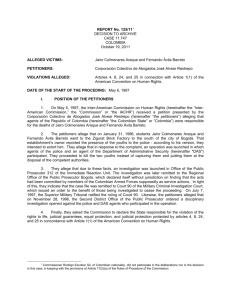
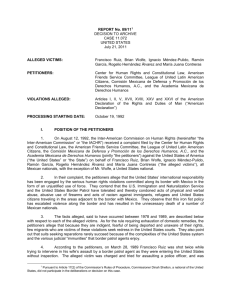
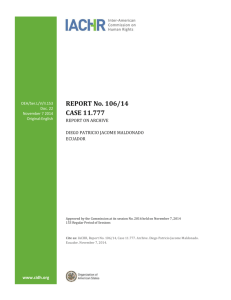
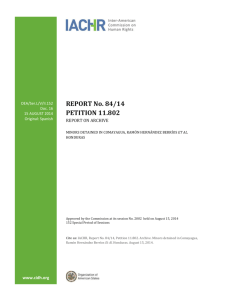
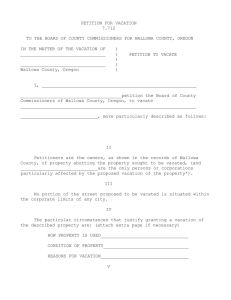
![REPORT No. 28/11[1] - Organization of American States](http://s3.studylib.net/store/data/007454871_1-d11bce2b7f6878531a2bda40061c9e5a-300x300.png)
